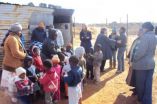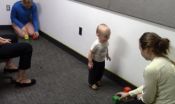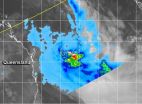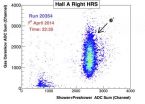(Press-News.org) Research on children orphaned by HIV/AIDS in South Africa may provide insight on how to identify and help children with emotional behavior issues in other areas of the world, which may have limited access to healthcare and further research that could lead to successful interventions.
A report on the global AIDS epidemic published by the United Nations mentions that due to the HIV/AIDS pandemic, which has left 12 million children orphaned in Sub-Saharan African, children are at an increased risk for mental health problems.
"There has been a big push to understand what we can do to help these kids, but also how to identify these children in the community," said Carla Sharp, a native of South Africa and an associate professor of clinical psychology and director of the Developmental Psychopathology Lab at the University of Houston.
"Part of the challenge is that there are four psychologists per 100,000 people in South Africa and .03 psychiatrists per 100,000 people. Individuals that are typically trained to help with mental health needs in the community are not available, and the few people who are available are often not culturally aware."
Sharp serves as principal investigator for a $951,147 grant funded by the National Institutes of Health (NIH), titled, "Emotional-behavior disorders in South African children affected by AIDS." The goal of the research study is to develop a reliable and valid diagnostic tool for the early detection of psychiatric disorder as a first step toward successful intervention.
The three-year cross-sectional study adapted two measures for the South African context, a clinical diagnostic interview and questionnaire using multiple informants (caregiver, teacher and self-report), to collect 750 interviews from children, ages 7 to 11 years old, which included 250 children orphaned by AIDS, 250 orphaned by other means and 250 non-orphaned.
"We wanted to look at a few factors, such as accessibility and feasibility of using the diagnostic measure in an educational context, substance use among caregivers and poverty among the three (orphaned) groups to see if there's anything special to being a child orphaned by AIDS – because they're lots of things going on like desertion, or parents dying in accidents or violence, " said Sharp.
Sharp notes the findings of the research study indicated poverty may wash out any of the effects between the children, "…so it almost doesn't matter if the children are orphaned by AIDS, they are going to be at risk for emotional and behavioral problems anyway because they are so poor."
What Sharp found through the study was the diagnostic tool to identify children with emotional behavior disorders that she thought would be used by teachers in schools for intervention was too complicated to work in the educational system.
"A more strategic point of intervention is to work with community-based organizations (CBO), often run by women in the community who themselves may be HIV-positive, poor, uneducated, mostly. But these organizations take these orphans in after school because of their problems at home, and they come and get a meal at the CBO," said Sharp. "We discovered these CBOs are highly motivated to work with us for intervention purposes, but beyond giving them a meal they don't know what to do with them."
The follow-up study Sharp plans to conduct is an intervention to help CBO care workers develop skills to respond to the emotional and cognitive needs of the children.
"Now, there is a validated population-based screen and an interview-based measure that can be done to help identify children," said Sharp. "What's lacking is the translation into actually using the research findings. I think there will need to be further research to see what are the barriers stopping people from using these assessment tools in all these settings they work in," said Sharp.
"The other problem that exists in South Africa, as well as here, is that once you've identified children with emotional behavior problems, then what do you do with them? That's the next step. It's all good and well if you are identifying them. That's what we are looking at now, but I don't think CBOs and church-based organizations always know how to intervene with kids if they were able to identify them."
She is currently working on and researching interventions that can be adapted for community-based interventions and address the needs of identified children.
The research team included professor Lochner Marais, the Centre for Development Support at the University of Free State, in conjunction with Donald Skinner, director of the Research on Health and Society at the University of Stellenbosch. Marais and Molefi Lenka led a team of four fieldworkers in South Africa.
Sharp earned her Ph.D. from the University of Cambridge and has received early career awards, including a National Alliance for Research on Schizophrenia and Depression's Young Investigator Award and the University of Houston Research Excellence Award.
She has received research grants for her work on psychological disorders in children and adolescents from the National Institutes of Health and various agencies.
She is a prolific writer, having extensively published papers and book chapters. She is lead editor of "Social Cognition and Developmental Psychopathology" and co-author of "Midbrain Mutiny: The Picoeconomics and Neureconomics of Disordered Gambling" and the upcoming "Handbook of Borderline Personality Disorder in Children and Adolescents" (May 31, 2014).
She also serves as director of research for The Menninger Clinic's Adolescent Treatment Program and principal investigator of The Menninger's adolescent outcomes project.
INFORMATION:
About the University of Houston
The University of Houston is a Carnegie-designated Tier One public research university recognized by The Princeton Review as one of the nation's best colleges for undergraduate education. UH serves the globally competitive Houston and Gulf Coast Region by providing world-class faculty, experiential learning and strategic industry partnerships. Located in the nation's fourth-largest city, UH serves more than 39,500 students in the most ethnically and culturally diverse region in the country. For more information about UH, visit the university's newsroom at http://www.uh.edu/news-events/
Researchers identify children with emotional behavior difficulties
Diagnostic tool easily accessible and administered by lay people in South Africa
2014-04-14
ELSE PRESS RELEASES FROM THIS DATE:
Henry Ford Hospital hits new heart valve surgery milestone
2014-04-14
DETROIT – Doctors at Henry Ford Hospital reached a medical milestone April 3, performing the 25th successful transcatheter valve replacement using a novel way to access the heart.
Henry Ford is the only hospital in the United States performing the unique procedure called transcaval valve replacement, which accesses the heart by temporarily connecting major blood vessels.
Northern Michigan resident Viola Waller, 80, underwent Henry Ford's first transcaval procedure on July 3, 2013 when traditional valve replacement was not medically viable.
"Nobody could help me here," ...
Dog ownership benefits families of children with autism, MU researcher finds
2014-04-14
COLUMBIA, Mo. –Many families face the decision of whether to get a dog. For families of children with autism, the decision can be even more challenging. Now, a University of Missouri researcher has studied dog ownership decisions in families of children with autism and found, regardless of whether they owned dogs, the parents reported the benefits of dog ownership included companionship, stress relief and opportunities for their children to learn responsibility.
"Children with autism spectrum disorders often struggle with interacting with others, which can make it difficult ...
Rare bone diseases and their dental, oral and craniofacial manifestations
2014-04-14
Alexandria, Va., USA – The International and American Associations for Dental Research (IADR/AADR) have published a paper titled "Rare Bone Diseases and Their Dental, Oral, and Craniofacial Manifestations." The complete review by researchers Sunday O. Akintoye, Andrea B. Burke, Alison M. Boyce, Michael Collins, Brian L. Foster, Rachel I. Gafni, Janice S. Lee, Mary Scott Ramnitz, Martha J. Somerman and J. Timothy Wright is published in the OnlineFirst portion of the IADR/AADR Journal of Dental Research (JDR).
Hereditary diseases affecting the skeleton are heterogeneous ...
Researchers describe 4 new species of 'killer sponges' from the deep sea
2014-04-14
MOSS LANDING, CA — Killer sponges sound like creatures from a B-grade horror movie. In fact, they thrive in the lightless depths of the deep sea. Scientists first discovered that some sponges are carnivorous about 20 years ago. Since then only seven carnivorous species have been found in all of the northeastern Pacific. A new paper authored by MBARI marine biologist Lonny Lundsten and two Canadian researchers describes four new species of carnivorous sponges living on the deep seafloor, from the Pacific Northwest to Baja California.
A far cry from your basic kitchen sponge, ...
Babies prefer fairness -- but only if it benefits them -- in choosing a playmate
2014-04-14
A couple of years ago a University of Washington researcher who studies how children develop social behaviors like kindness and generosity noticed something odd. The 15-month-old infants in her experiments seemed to be playing favorites among the researchers on her team, being more inclined to share toys or play with some researchers than others.
"It's not like one experimenter was nicer or friendlier to the babies – we control for factors like that," said Jessica Sommerville, a UW associate professor of psychology. She took a closer look at the data and realized that ...
NASA sees Tropical Cyclone Ita over the Coral Sea
2014-04-14
Tropical Cyclone Ita made landfall in northeastern Queensland, Australia on April 11 as a powerful Category 4 hurricane on the Saffir-Simpson scale, moved south and re-emerged in the Coral Sea on April 14 where NASA's TRMM and NASA-NOAA's Suomi NPP Satellites captured imagery of the weakened storm.
The VIIRS instrument aboard NASA-NOAA's Suomi NPP satellite captured a visible look at Ita's elongating structure on April 14 at 4:12 UTC/12:12. The Visible Infrared Imaging Radiometer Suite (VIIRS) instrument collects visible and infrared imagery and global observations of ...
Website information on colon cancer too complex, fails to address key concerns
2014-04-14
DALLAS – April 14, 2014 – Popular web information on colorectal cancer is too difficult for most lay people to read and doesn't address the appropriate risks to and concerns of patients, a study by UT Southwestern Medical Center gastroenterologists suggests.
In a review of a dozen popular websites, most of the online patient education materials for colorectal cancer screening were written beyond the recommended sixth-grade reading level, while content on the sites failed to address key risks, as well as the barriers to and benefits of screening, according to the study's ...
Beam on target!
2014-04-14
Late on April 1, the crown jewel of the Department of Energy's Thomas Jefferson National Accelerator Facility ("Jefferson Lab") sparkled its way into a new era. Following an upgrade of the Continuous Electron Beam Accelerator Facility, the CEBAF accelerator delivered the highest-energy electron beams it has ever produced into a target in an experimental hall, recording the first data of the 12 GeV era. The machine sent electrons around the racetrack three times (known as "3-pass" beam), resulting in 6.11 GeV electrons at 2 nanoAmps average current for more than an hour.
"This ...
NASA sees remnants of Tropical Depression Peipah over Southern Philippines
2014-04-14
Tropical Depression Peipah has been very stubborn and has moved over the southern and central Philippines bringing clouds, showers and gusty winds. NASA-NOAA's Suomi NPP satellite captured an image that showed Peipah's clouds covering the Visayas and Mindanao regions of the country.
The VIIRS instrument aboard NASA-NOAA's Suomi NPP satellite captured a visible look at the remnant clouds associated with former Tropical Depression Peipah on April 14 at 4:24 UTC/12:24 a.m. EDT. The Visible Infrared Imaging Radiometer Suite (VIIRS) instrument collects visible and infrared ...
Pharmacists can significantly improve blood pressure, cholesterol in stroke patients
2014-04-14
Stroke patients managed by a pharmacist had a 12.5% improvement in blood pressure and low-density lipoprotein (LDL), or "bad" cholesterol levels compared with a control group, according to a clinical trial published in CMAJ (Canadian Medical Association Journal).
Patients who have a stroke or "mini stroke" (transient ischemic attack) are at high risk of adverse cardiovascular events. Management of high blood pressure and cholesterol after a stroke is important because it can substantially reduce the risk of a negative event; however, many patients receive suboptimal care. ...
LAST 30 PRESS RELEASES:
Low-intensity treadmill exercise preconditioning mitigates post-stroke injury in mouse models
How moss helped solve a grave-robbing mystery
How much sleep do teens get? Six-seven hours.
Patients regain weight rapidly after stopping weight loss drugs – but still keep off a quarter of weight lost
GLP-1 diabetes drugs linked to reduced risk of addiction and substance-related death
Councils face industry legal threats for campaigns warning against wood burning stoves
GLP-1 medications get at the heart of addiction: study
Global trauma study highlights shared learning as interest in whole blood resurges
Almost a third of Gen Z men agree a wife should obey her husband
Trapping light on thermal photodetectors shatters speed records
New review highlights the future of tubular solid oxide fuel cells for clean energy systems
Pig farm ammonia pollution may indirectly accelerate climate warming, new study finds
Modified biochar helps compost retain nitrogen and build richer soil organic matter
First gene regulation clinical trials for epilepsy show promising results
Life-changing drug identified for children with rare epilepsy
Husker researchers collaborate to explore fear of spiders
Mayo Clinic researchers discover hidden brain map that may improve epilepsy care
NYCST announces Round 2 Awards for space technology projects
How the Dobbs decision and abortion restrictions changed where medical students apply to residency programs
Microwave frying can help lower oil content for healthier French fries
In MS, wearable sensors may help identify people at risk of worsening disability
Study: Football associated with nearly one in five brain injuries in youth sports
Machine-learning immune-system analysis study may hold clues to personalized medicine
A promising potential therapeutic strategy for Rett syndrome
How time changes impact public sentiment in the U.S.
Analysis of charred food in pot reveals that prehistoric Europeans had surprisingly complex cuisines
As a whole, LGB+ workers in the NHS do not experience pay gaps compared to their heterosexual colleagues
How cocaine rewires the brain to drive relapse
Mosquito monitoring through sound - implications for AI species recognition
UCLA researchers engineer CAR-T cells to target hard-to-treat solid tumors
[Press-News.org] Researchers identify children with emotional behavior difficultiesDiagnostic tool easily accessible and administered by lay people in South Africa








